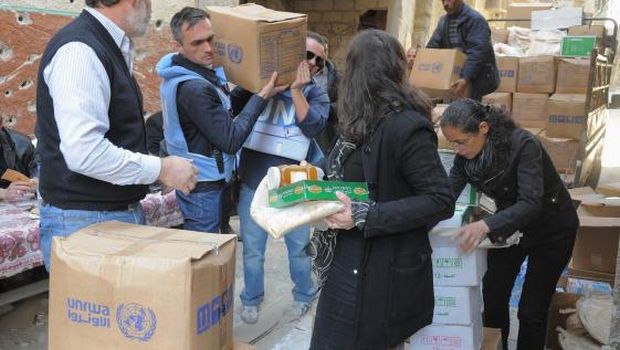The image of the ration card issued by the United Nations Relief and Works Agency for Palestine Refugees (UNRWA) remains fresh in my memory. The card was blue in color and its borders were surrounded by puncture marks caused but its being perforated each time rations were collected.
I am stunned by the shocking images of Syrian and other refugees, wherever they are in our calamity-stricken world, flocking to get a bottle of water or a loaf of bread. That said, whenever I see such images I cannot help but recall that even in the Gaza Strip we were in a better situation. We did not jostle with one another; we stood in an orderly queue waiting for our turn, and when we reached the reception area, we would receive rations for our family as determined by this card. This included flour, rice, sugar, oil, and occasionally parcels of second-hand clothes donated by citizens of rich countries. Then, quietly, we would all go home, and then to school if we were students at one of the UNRWA schools that opened in the afternoon.
This image of the distant past came to my mind earlier this week when I saw a report on a farewell visit to Palestine by Italian diploma and UNRWA deputy commissioner-general to Palestine, Filippo Grandi, who has held this position since January 19, 2010. I found myself wondering: “Could a body formed by the international community to secure the victory of peace over war not do more to end the Palestinian–Israeli conflict, rather than limiting its role to caring for refugees?
In principle, the answer could be “yes” or “no” based on your own personal conviction regarding the UN’s ability to effectively force opposing parties in any conflict to do anything. These same conflicts devour the lives of people across the world, while the warlords eat and drink at the expense of the victims.
I may be in the tiny minority on this planet who believes the UN could and should play a more effective role to impose peace on our planet. However, realistically, others will say this is not possible, because the UN has no control over the world’s superpowers, starting with the five permanent members of the UN Security Council and those who are close to them. They would therefore say that I am asking for the impossible.
That is true. It is impossible to imagine the secretary-general of the UN issuing a resolution which orders a ceasefire in a conflict, and for the commanders of the warring armies to accede to those orders immediately. Could UN Secretary-General Ban Ki-moon, for example, be able to dismiss any army commander, even a commander of one of the smallest and least armed countries in the world? No chance; that vision is closer to a cartoon image than any practical reality, not to mention the UN Charter, which does not allow this either.
However, that does not eliminate the possibility of a more effective role for the international body in order to bring warring parties closer together and help them resolve their complicated issues, which only become more and more complicated over the years. For example, the article on the right of return for Palestinian refugees was, and will always remain, one of the most sensitive and complicated issues of Palestinian–Israeli negotiations.
There are UN resolutions which confirm the right of return for refugees who left their homes because of war, but the UN cannot implement its resolutions on the ground.
In the case of the Palestinian–Israeli situation, and because disagreement over this article has resulted in failure to achieve peace, the UN can bridge the gap by suggesting a number of practical ideas. The first of these could be an initiative to carry out an accurate survey of Palestinian refugees who are subject to the right of return, and then move one step forward by organizing a referendum whether they truly want to return or not.
On its official website, UNRWA says: “We provide assistance and protection for some 5 million Palestine refugees.” How many of these does the term “refugee” apply to? The answer is also on the website: “Palestine refugees are defined as ‘persons whose normal place of residence was Palestine during the period 1 June 1946 to 15 May 1948, and who lost both home and means of livelihood as a result of the 1948 conflict.’”
How many of these people and their children insist on the right to return? An accurate answer will only be revealed through a legal referendum carried out by the UN and funded by the permanent members of the Security Council. The host states can organize it so that the accurate result can help the Palestinian and Israeli sides reach a practical solution to one of the most complicated points of the negotiations.
In the end, the United Nations can play a more effective because achieving peace and ending any conflict are both possible, but only when those who hold the fates of nations in their hands say: “Enough is enough.”
The experienced of the last 60 years proved the failure of any mediator who tried to impose solutions on the Palestinians and the Israelis, and it is possibly, and regrettably, what also awaits the efforts of John Kerry.
But the river keeps flowing, it will not stop. We are waiting for the parties of the conflict to decide that it is time to drink from the cup of peace; no one can force them to do this. As for the majority who want coexistence and a secure future, all they can do is be patient, and hope.
